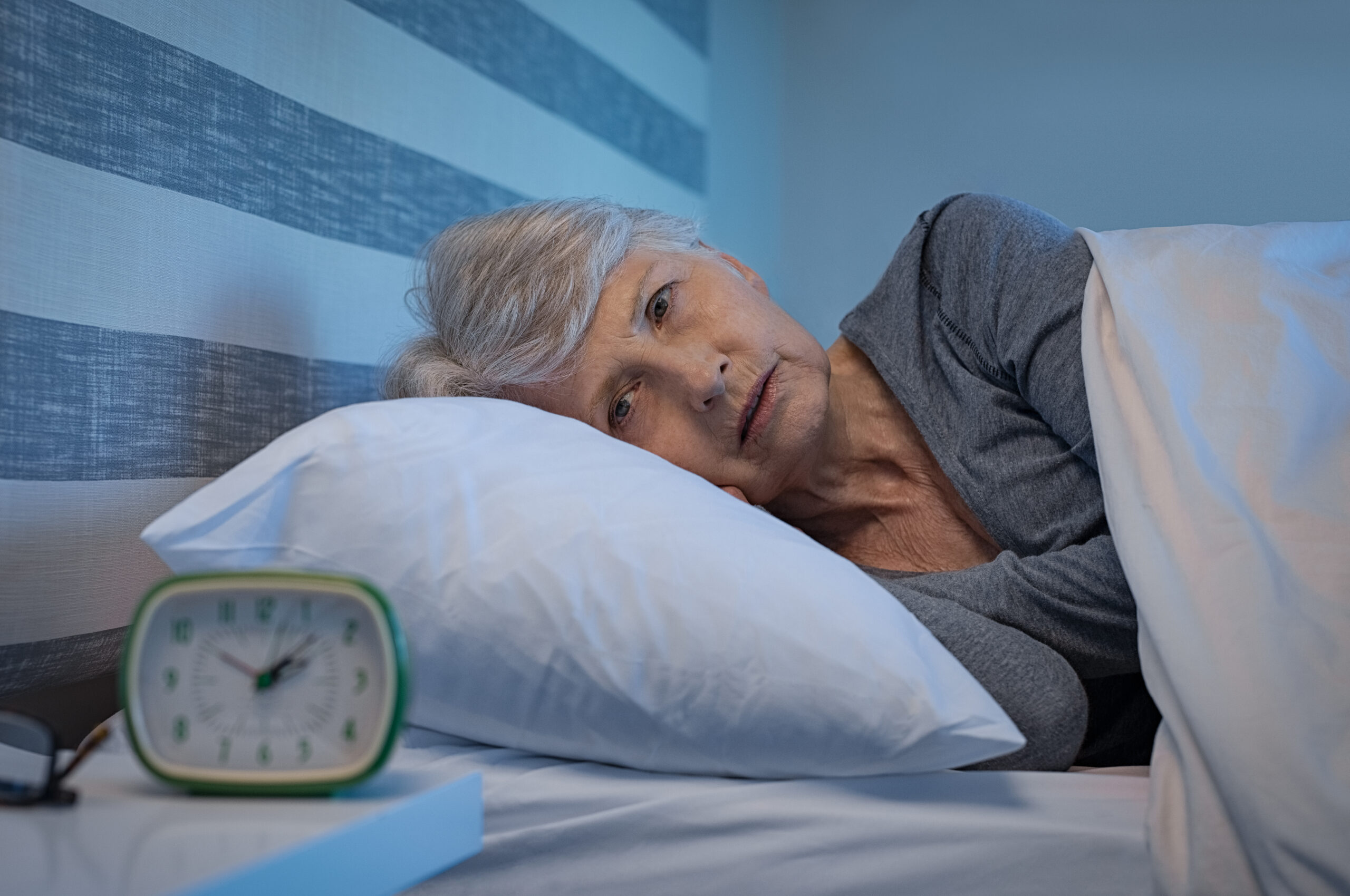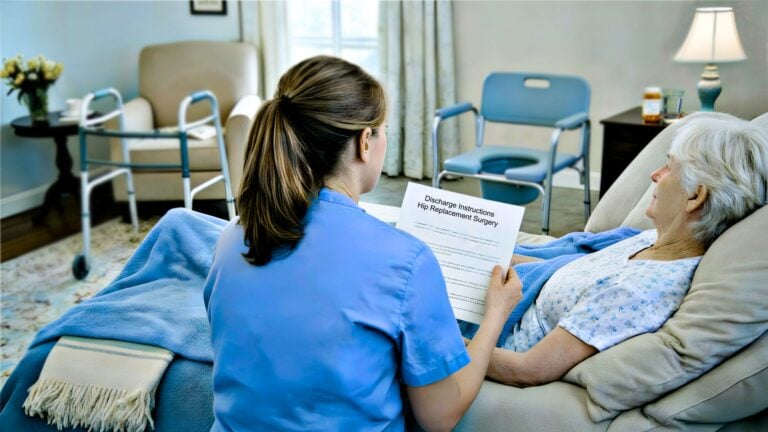What Every Senior and Family Caregiver Should Know
Every 40 seconds, someone in the United States has a stroke. Every 3 minutes and 14 seconds, someone dies from one. And while most of us know that high blood pressure, diabetes, and smoking increase stroke risk, fewer people realize that the quality and quantity of their sleep play an equally critical role in protecting their brain health.
For seniors and family caregivers, understanding the connection between sleep and stroke isn’t just interesting—it could be lifesaving. The research is now clear: poor sleep significantly increases your risk of suffering a stroke, and improving sleep quality may be one of the most effective steps you can take to protect yourself.
The Alarming Link Between Sleep and Stroke: What the Research Shows
A landmark 2025 meta-analysis published in the journal GeroScience analyzed 43 studies involving hundreds of thousands of participants and yielded strong findings on the association between sleep and stroke risk.
Key Findings (2024-2025 Research)
| Sleep Duration | Stroke Incidence Risk | Mortality Risk |
|---|---|---|
| Short sleep (≤5-6 hours) | 29% increased risk | 12% increased risk |
| Long sleep (≥8-9 hours) | 46% increased risk | 36% increased risk |
| Optimal sleep (7-8 hours) | Baseline risk | Baseline risk |
The research reveals a U-shaped relationship: both too little sleep and too much sleep are associated with significantly higher stroke risk. But the dangers don’t stop there.
Additional Research Findings
- 48% greater chance of heart disease or stroke in people who sleep less than 6 hours with disturbed sleep (University of Warwick)
- 15% greater chance of dying from stroke with chronic sleep deprivation
- 63% higher stroke risk in people with poor sleep quality combined with either short or long sleep duration (8-year Chinese study)
- 2.52 times higher risk of ischemic stroke in elderly adults with severe sleep apnea (Spanish population study)
The 2025 American Heart Association Statistics Update now includes sleep as one of “Life’s Essential 8″—the core health behaviors that affect cardiovascular and brain health. This recognition places sleep alongside diet, exercise, and blood pressure control as a fundamental pillar of stroke prevention.
Why Poor Sleep Damages Your Brain and Blood Vessels
Scientists have identified multiple biological pathways through which inadequate sleep increases stroke risk. Understanding these mechanisms helps explain why prioritizing sleep is so important.
How Sleep Deprivation Harms Your Cardiovascular System
Increased Blood Pressure
Sleep triggers typically a 10-20% decrease in blood pressure during the night—a phenomenon called “nocturnal dipping.” When sleep is disrupted, this healthy dip doesn’t occur. Research shows that a 5% reduction in nocturnal blood pressure dipping is associated with a 20% increase in cardiovascular mortality. Chronic sleep deprivation has been linked to “non-dipping” hypertension, which significantly elevates stroke risk.
Inflammation and Oxidative Stress
Sleep deprivation triggers systemic inflammation throughout the body. Animal studies demonstrate that chronic sleep restriction leads to increased markers of oxidative stress and inflammation in blood vessels, causing endothelial dysfunction—the same process that underlies atherosclerosis and stroke.
Metabolic Disruption
Poor sleep impairs glucose metabolism and insulin sensitivity. Research shows that just four nights of sleep restriction can reduce insulin sensitivity by 23%. This metabolic dysfunction contributes to diabetes, a major stroke risk factor.
Elevated Cortisol and Sympathetic Activation
Sleep-deprived individuals show elevated cortisol (stress hormone) levels and increased sympathetic nervous system activity. This chronic “fight or flight” state strains the heart and blood vessels.
Atherosclerosis Development
Long sleep duration has been associated with increased levels of inflammatory biomarkers and higher rates of carotid artery atherosclerosis, atrial fibrillation, and white matter brain abnormalities—all precursors to stroke.
Why Seniors Are Especially Vulnerable
Sleep problems become increasingly common with age, putting older adults at particularly high risk for sleep-related health complications, including stroke.
Sleep Problems in Seniors: The Statistics (2024-2025)
| Sleep Issue | Prevalence in Older Adults |
|---|---|
| Any sleep disturbance | 30-70% |
| Obstructive sleep apnea | 46% (community-dwelling) |
| Poor sleep quality | 40% |
| Insomnia symptoms | Up to 50% |
| Sleep maintenance problems | 20-22% (ages 45+) |
| Excessive daytime sleepiness | 19-20% |
A 2024 systematic review of more than 995,000 older adults across 36 countries found that sleep problems affect nearly half of older adults worldwide.
Why Sleep Changes with Age
Several age-related factors contribute to disrupted sleep in older adults:
Circadian Rhythm Shifts
The body’s internal clock naturally shifts earlier with age, which is why many seniors feel tired earlier in the evening and wake very early in the morning. This “advanced sleep-wake phase disorder” is particularly common among older adults and can result in insufficient total sleep time.
Changes in Sleep Architecture
Polysomnographic studies indicate that older adults spend less time in slow-wave sleep and REM sleep than younger adults. This lighter sleep makes them more susceptible to nighttime awakenings and leaves them feeling less refreshed in the morning.
Medical Conditions
Chronic conditions common in older adults—including heart disease, diabetes, arthritis, urinary problems, and chronic pain—can impair sleep quality. Research indicates that chronic pain is present in 67-88% of people with sleep disorders.
Medications
Many commonly prescribed drugs for older adults can disrupt sleep, including certain blood pressure medications, diuretics, and antidepressants.
Neurodegenerative Diseases
Conditions such as dementia and Parkinson’s disease are strongly associated with sleep disturbances. The presence of dementia is one of the most common reasons why older people have trouble sleeping.
Sleep Apnea: A Hidden Stroke Danger
Among sleep disorders, obstructive sleep apnea (OSA) poses the most significant stroke risk for seniors. This condition, in which breathing repeatedly stops and starts during sleep, is now recognized as an independent risk factor for stroke.
Sleep Apnea and Stroke: Critical Statistics
- 68% of patients in one major stroke study had obstructive sleep apnea
- 1.97 times higher risk of stroke or death from any cause with OSA (after adjusting for all other risk factors)
- 2.24 times higher risk in the unadjusted analysis
- 2.52 times higher risk of ischemic stroke in the elderly with severe OSA (AHI ≥30)
- Stroke is the second-leading cause of death worldwide, and OSA is an independent risk factor
Why Sleep Apnea Is So Dangerous
During apnea episodes, blood oxygen levels drop dramatically—a condition known as intermittent hypoxia. Research at the University of Toronto and other institutions has found that this oxygen deprivation causes measurable damage to brain tissue. Subsequent brain autopsies of patients who had sleep apnea revealed higher incidences of oxygen-related damage that contributes to stroke risk.
Sleep apnea also triggers:
- Repeated blood pressure surges throughout the night
- Increased risk of atrial fibrillation (a major stroke risk factor)
- Accelerated atherosclerosis
- Increased blood clotting tendency
- Chronic inflammation
Recognizing Sleep Apnea
Warning signs include:
- Loud snoring
- Witnessed breathing pauses during sleep
- Gasping or choking during sleep
- Morning headaches
- Excessive daytime sleepiness
- Difficulty concentrating
- Irritability
Many seniors with sleep apnea don’t fit the “typical” profile (overweight, middle-aged male). Post-stroke sleep apnea is prevalent and often underdiagnosed. If you or your loved one experiences any of these symptoms, speak with a healthcare provider about sleep testing.
Stroke in America: The Current Crisis
Understanding the scope of stroke helps illustrate why prevention—including sleep improvement—matters so much.
2024-2025 Stroke Statistics (American Heart Association/CDC)
- 795,000+ Americans have a stroke each year
- 1 in 6 cardiovascular deaths (17.6%) is due to stroke
- Stroke prevalence increased 7.8% from 2011-2013 to 2020-2022
- $56.2 billion in stroke-related costs annually (2019-2020)
- More than half of stroke survivors age 65+ have reduced mobility
- Stroke is a leading cause of severe long-term disability
Global Perspective (World Stroke Organization 2025)
- 11.9 million new strokes worldwide each year
- 93.8 million people living with the effects of stroke
- 70% increase in stroke incidence since 1990
- 44% increase in stroke deaths since 1990
- 87% of stroke deaths occur in low- and middle-income countries
The increasing burden of stroke, particularly among middle-aged adults, underscores the urgency of addressing modifiable risk factors like sleep.
Improving Your Sleep: Practical Strategies That Work
The good news: sleep is a modifiable risk factor. Unlike age or genetics, you can take concrete steps to improve sleep quality and potentially reduce your stroke risk.
Optimize Your Sleep Environment
Make Your Bedroom a Sleep Sanctuary:
- Keep the room cool (65-68°F is optimal for most people)
- Ensure complete darkness with blackout curtains or an eye mask
- Eliminate noise sources or use white noise/a fan
- Remove electronics—the blue light from screens suppresses melatonin
- Invest in a comfortable, supportive mattress and pillows
- Keep the bed clean and well-made
Reserve the Bedroom for Sleep:
- Don’t watch TV in bed
- Don’t use phones, tablets, or laptops in bed
- Don’t work or pay bills in the bedroom
- This trains your brain to associate the bedroom with sleep
Establish Healthy Sleep Habits
Maintain a Consistent Schedule:
- Go to bed and wake up at the same time every day—even on weekends
- This reinforces your body’s natural circadian rhythm
- Avoid the temptation to sleep in, which can disrupt your schedule
Watch What You Consume:
- Caffeine: Avoid after noon or 2 PM; caffeine has a half-life of 5-6 hours
- Alcohol: While it may help you fall asleep, it disrupts sleep quality later in the night
- Large meals: Avoid eating heavily within 3-4 hours of bedtime
- Spicy foods: Can cause heartburn and discomfort that interferes with sleep
- Sugar: High sugar intake is associated with lighter, more restless sleep
- Fluids: Limit liquids close to bedtime to reduce nighttime bathroom trips
Be Physically Active:
Regular exercise is one of the most effective natural sleep aids:
- Older adults who exercise regularly fall asleep faster and sleep longer
- Physical activity improves both sleep quantity and quality
- Aim for at least 30 minutes of moderate activity most days
- Avoid vigorous exercise within 2-3 hours of bedtime
Get Natural Light Exposure:
- Bright sunlight helps regulate melatonin and circadian rhythms
- Aim for at least 2 hours of natural light exposure daily
- Morning light is especially beneficial for resetting your body clock
- If natural light is limited, consider a light therapy box
Manage Stress:
- Chronic stress and anxiety are major contributors to insomnia
- Practice relaxation techniques before bed: deep breathing, progressive muscle relaxation, or meditation
- Write down worries earlier in the day rather than ruminating at night
- Consider cognitive behavioral therapy for insomnia (CBT-I), which research shows is more effective than sleep medications
When to Seek Professional Help
Consult a healthcare provider if you experience:
- Chronic difficulty falling or staying asleep
- Loud snoring or witnessed breathing pauses
- Excessive daytime sleepiness despite adequate time in bed
- Restless legs or uncomfortable sensations in your legs at night
- Sleep problems that don’t improve with lifestyle changes
- Any symptoms that concern you
Sleep testing (polysomnography) can diagnose conditions like sleep apnea that require specific treatment. For sleep apnea, continuous positive airway pressure (CPAP) therapy is highly effective and may reduce stroke risk.
How Home Care Can Help Improve Sleep
Professional caregivers can play a vital role in helping older adults establish and maintain healthy sleep patterns, thereby reducing the risk of sleep-related health problems, including stroke.
Creating a Sleep-Friendly Environment
Our caregivers can help with:
- Ensuring the bedroom is dark, quiet, and comfortable
- Removing clutter and tripping hazards
- Adjusting room temperature for optimal sleep
- Setting up white noise machines or fans if helpful
- Making sure beds are clean, fresh, and inviting
Supporting Healthy Sleep Routines
Home care professionals assist with:
- Meal planning and preparation: Ensuring dinner is eaten at an appropriate time and avoiding foods that interfere with sleep
- Medication reminders: Ensuring medications are taken at the right time (some can affect sleep if taken too late)
- Daily activity: Keeping your loved one engaged and active during the day, which promotes better sleep at night
- Limiting naps: Helping seniors avoid excessive daytime sleeping that can disrupt nighttime rest
- Evening routines: Establishing calming pre-bed rituals
Reducing Stress and Worry
One of the most significant benefits of home care is peace of mind. When seniors know that help is available:
- They worry less about managing daily tasks
- Family caregivers experience reduced stress and sleep better themselves
- The burden of household chores doesn’t keep anyone up at night
- Medical appointments are kept, and health conditions are monitored
Research shows that stress and anxiety are major contributors to insomnia. Having professional support can break the cycle of worry that keeps so many older adults awake.
Monitoring Sleep Patterns and Concerns
Our caregivers are trained to notice:
- Changes in sleep patterns that may indicate a problem
- Signs of excessive daytime sleepiness
- Symptoms of sleep apnea (snoring, witnessed breathing pauses)
- Nighttime confusion or wandering (which can indicate sleep disorders or dementia)
- When medical attention may be needed
Early identification of sleep problems allows for prompt treatment, which may reduce the risk of serious complications like stroke.
The Bottom Line: Sleep Is Brain Protection
The evidence is clear: quality sleep is not a luxury—it’s essential for cardiovascular and brain health. For seniors, who already face elevated stroke risk due to age-related factors, prioritizing sleep becomes even more critical.
Key Takeaways:
- Both short sleep (≤5-6 hours) and long sleep (≥8-9 hours) increase stroke risk—aim for 7-8 hours.
- Poor sleep quality matters as much as quantity—fragmented, light sleep is harmful.
- Sleep apnea nearly doubles stroke risk and should be evaluated if symptoms are present.
- Up to 50% of seniors experience insomnia—but it’s treatable, not inevitable.
- Sleep is now recognized as one of “Life’s Essential 8” for cardiovascular health.
- Simple lifestyle changes can significantly improve sleep—it’s never too late to start.
- Home care can help establish and maintain healthy sleep habits.
Take Action for Better Sleep Today
If you or your loved one is struggling with sleep, don’t dismiss it as “just part of getting older.” Poor sleep is not inevitable, and the health consequences—including increased stroke risk—are too serious to ignore.
Contact All Heart Home Care at (619) 736-4677 to learn how our professional caregivers can help improve sleep quality and overall well-being. We offer free in-home consultations where we can:
- Assess your loved one’s current sleep patterns and challenges
- Develop strategies to improve sleep hygiene
- Create routines that promote restful nights
- Provide the daily support that reduces stress and worry
- Help maintain an active lifestyle that promotes healthy sleep
A good night’s sleep could be one of the most important things you do for your brain health. Let us help make it possible.
All Heart Home Care is a veteran-owned, nurse-led home care agency serving San Diego County. We provide companion care, personal care, 24-hour care, dementia support, respite care, and post-hospital recovery services—call (619) 736-4677 to learn more.
References
- American Heart Association. 2025 Heart Disease and Stroke Statistics Update. Circulation. 2025.
- Centers for Disease Control and Prevention. Stroke Facts. Updated October 2024.
- GeroScience. Inadequate sleep increases stroke risk: meta-analysis of 43 studies. 2025.
- World Stroke Organization. Global Stroke Fact Sheet 2025.
- Brain Circulation. The link between sleep duration and stroke risk. 2025.
- National Poll on Healthy Aging. University of Michigan. 2024.
- New England Journal of Medicine. Obstructive Sleep Apnea as a Risk Factor for Stroke and Death.
- Stroke. Severe Sleep Apnea and Risk of Ischemic Stroke in the Elderly.
- Sleep Foundation. Aging and Sleep. 2025.
- National Institute on Aging. Sleep and Older Adults. 2025.






